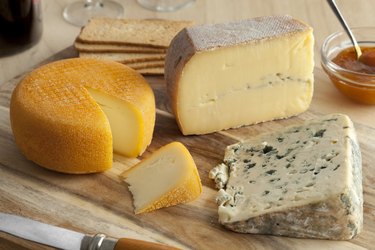
Cheese and crackers eaten in moderation can be a healthy snack, especially if you choose the right types. Whole-grain crackers, for example, provide beneficial fiber, while cheese can help you get the recommended amounts of calcium and phosphorus in your diet. You'll need to watch your portion size with even the healthier types of cheese and crackers to avoid eating too many calories and to limit your fat and sodium consumption.
Calorie Content
Video of the Day
You'll need to plan for the extra calories if you eat cheese and crackers as a snack. Eating an ounce of most cheeses alone puts you over the recommended 100 calories per snack. For example, an ounce of cheddar has about 113 calories, and the same amount of Swiss cheese has 106 calories. Choosing low-fat cheeses can help. Part-skim mozzarella has just 71 calories per ounce. The crackers you choose can also vary greatly in calories. A six-piece serving of whole wheat crackers has about 120 calories. You can eat 10 saltines for about the same amount of calories, or about three large rye crispbread crackers.
Video of the Day
Fat Content
Regular cheese can be high in fat and saturated fat, potentially increasing your risk for high cholesterol and heart disease. An ounce of cheddar has 14 percent of the daily value for fat and 30 percent of the DV for saturated fat. Swiss is slightly better, with 12 percent of the DV for fat and 25 percent of the DV for saturated fat. Choose part-skim mozzarella instead to limit your fat intake -- each ounce has 7 percent of the DV for fat and 14 percent of the DV for saturated fat. Crackers tend to be low in fat in general, with rye crackers often a lower-fat choice than saltines or whole wheat crackers.
Fiber Content
Eating more fiber can help lower your risk for high cholesterol, heart disease, constipation and diverticulosis. It can also add bulk and slow the emptying of your stomach so you feel full longer. Cheese isn't a significant source of fiber, but crackers can be. Avoid saltines, which only have about 0.8 grams of fiber for 10 crackers. Instead, choose whole wheat crackers, which have 2.9 grams in just six crackers, or rye crackers, which have 5.1 grams in three large crispbreads, or about 20 percent of the DV for fiber.
Sodium Content
Getting too much sodium in your diet, as most Americans do, can increase your risk for high blood pressure and heart disease. Cheese and salty snacks are among the top 10 sources of sodium in the American diet. To limit your sodium intake, consider Swiss cheese, which has just 20 milligrams of sodium per ounce, or 1 percent of the DV, instead of cheddar or mozzarella, which each have 7 percent of the DV for sodium per ounce. Rye crackers are among the lower-sodium options for crackers, with 123 milligrams in three large crispbreads, compared to 197 milligrams, or 8 percent of the DV, for 6 whole wheat crackers and 282 milligrams, or 12 percent of the DV, for 10 saltines.
- MedlinePlus: Snacks for Adults
- Health-Alicious-Ness.com: Nutrition Facts Comparison Tool, Cheese
- Health-Alicious-Ness.com: Nutrition Facts Comparison Tool, Crackers
- Centers for Disease Control and Prevention: Sodium: The Facts
- Colorado State University Extension: Dietary Fiber
- University of Illinois Extension: Eating for Cardiovascular Health